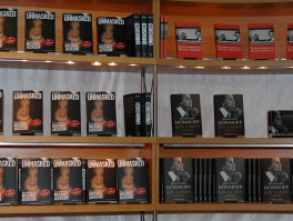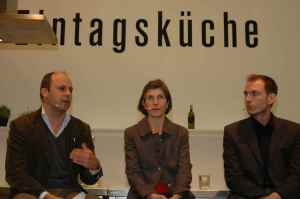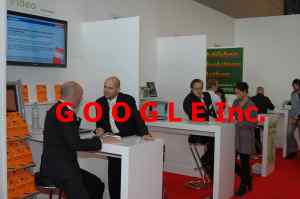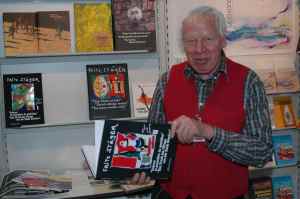 Google and China:
Google and China:
wrapping up the Frankfurt Book Fair 2009
Response to the three posts on the Frankfurt Book Fair was good. The digital debate was less a debate and more of a statement of claims. Digital reading got thumbs up for being less burdensome than lugging around lots of books and because it simply is the way things are moving along. Though I suspect that it’s not so much the weight of the books than the posture of the reader that has an effect on the back. Goethe, in his “Garden House” in Weimar, had a strange contraption built with a saddle that allowed him to work in an upright position…
But the digital content issue was mostly avoided, and that is a big one, because it means control of the gateway and distribution. I cannot help notice an incredible confidence in the fair-mindedness of behemoths like Google. Yet, the “in” and “out” problem has not been resolved or even noticed apparently. So let me put out one more question: When has anyone been able to argue with the EULAs and still get service from, say, a software company? And who reads the EULAs thoroughly? Once you’re “in”, you have the bennies as long as Google allows them to be fed to you. When you are out, you are, in Brave New World lingo, a savage. And my experience with many large companies, especially in the USA, has been that once you are out, you are a nonperson, though this term comes from another famous dystopia. You either accept and sign, or be damned.
(Google tends to ignore privacy and rights, including copyright, until getting rapped on its many fingers: In Switzerland, finally, Google View has run into a brick wall named the Officer for Data Protection, who demanded that the company be more careful with its anonymizing of photos. The Swiss are taking their privacy seriously, which is a good thing, even with the cute little Google).
The big cheese
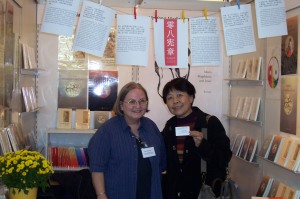
As for China: Again, the growth figures make economists clap their hands and foam at the mouth. Better growth than ever before, heavens, if only the west could do the same… Regina Berlinghof, who was mentioned in Part III Chinese Checkers, received a very high-level visit, namely a remarkable Chinese dissident, journalist Dai Qing. Her extraordinary career is a profile in courage and outspokenness. Of course, one of her main thrusts is environmental – she opposed the megalomaniac Three Gorges Dam project – which is not terribly sexy these days. “She was first invited, then uninvited, and ultimately was not allowed to speak,“ writes Berlinghof. “She came by my booth and was delighted to see the action, and she thanked me.” Dai Qing was one of the writers to make a statement at the pre-Fair meeting that irritated China’s powers-that-be
It seems the Lilliputians managed at best to tickle the giant.
The online edition of the New York Times ran an article on China at the Book Fair. Here is a grand statement from that source: “Unlike the exquisitely choreographed ceremonies during the Beijing Olympics, the fair presented a messier and more ambiguous portrait of China on the rise — a country still deeply uncomfortable with its own discordant voices, yet eager to become more competitive with the West in the realm of ideas.”
Let us be a little more precise: exquisitely choreographed with a truncheon. And one can only delight at the euphemistic “uncomfortable with its own discordant voices.” The article mentions several prominent dissidents, notably Dai Qing and Liao Yiwu. Liao is an author and musician who was not only prohibited from traveling to Frankfurt, but was also asked to not shoot off his mouth. Apparently, the article closes, Liao Yiwu is optimistic: “Only by going through these incidents, it seems, can we become known to the outside world,” he told the New York Times. There was a time, when any dissident bogus or genuine was celebrated and put on the front page of every newspaper, as long as he or she came from a Communist country. Today, things have changed. If an obvious hoax with a hot-air balloon can occupy so many column inches for so long, how long does Liao think his name or his depressing book about the Capitalo-Communist revolution in China will be news, if it ever is. What Mr. Liao does not understand — and what the China’s media managers understand full well: The Cold War has been declared over, criticism and containment is out. Business models have taken over, and if the bottom line is good, no one will complain. We are experiencing what Marx rightly called the “fetishism of commodities.”
(That closes Frankfurt for now. Thanks for reading)


